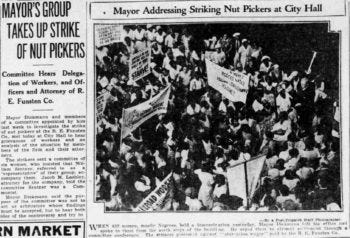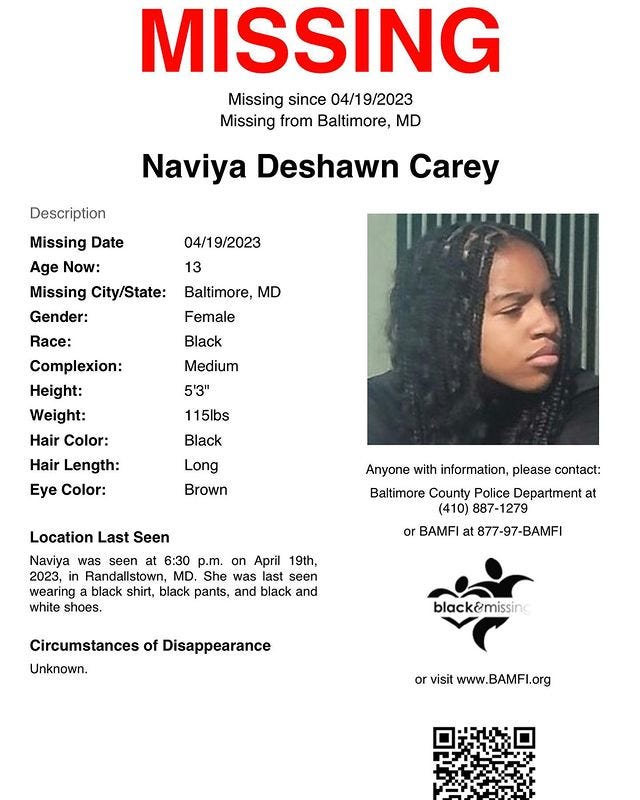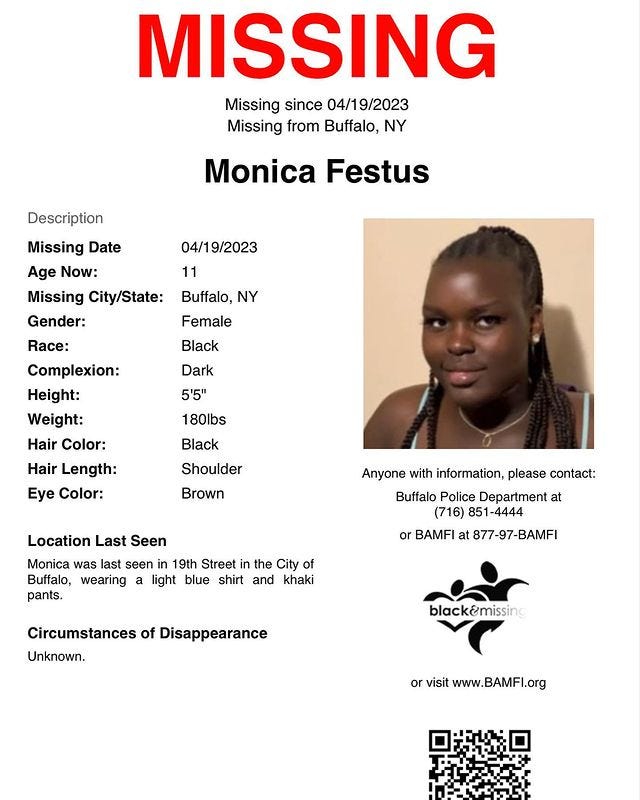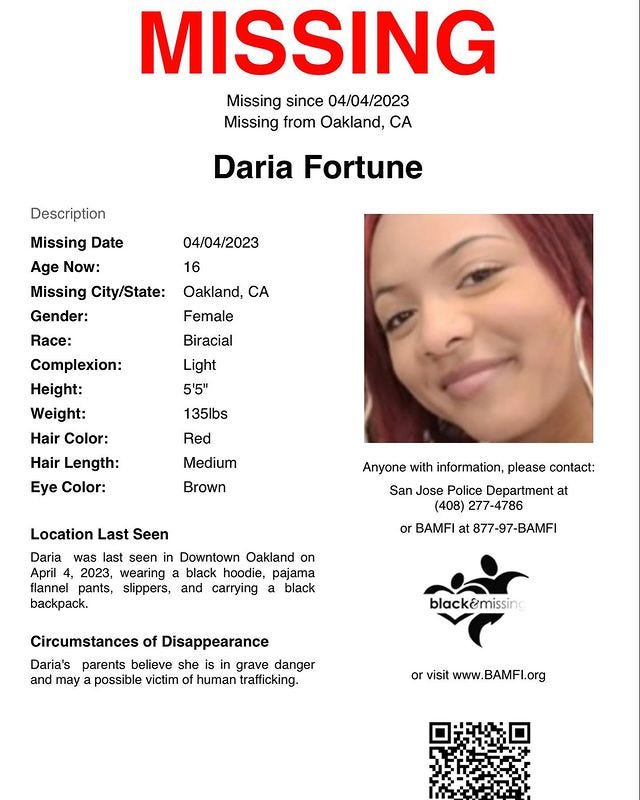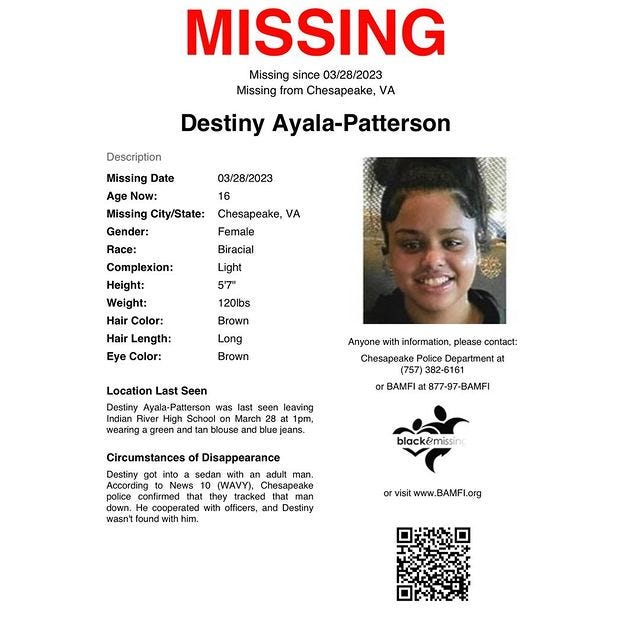The unsolved murders of 3 Black sisters, the benefits of giving Black moms cash, and the Black women who revolutionized labor protests
A mother demands answers from Texas police, a radical non-profit gives Black mothers $1000 a month, a receipt for Black women's vital role in labor movements and more.
No arrests have been made in the murders of 3 Black sisters found in a Texas pond last July. Their mother is demanding answers: ‘All I want is justice for my babies.’
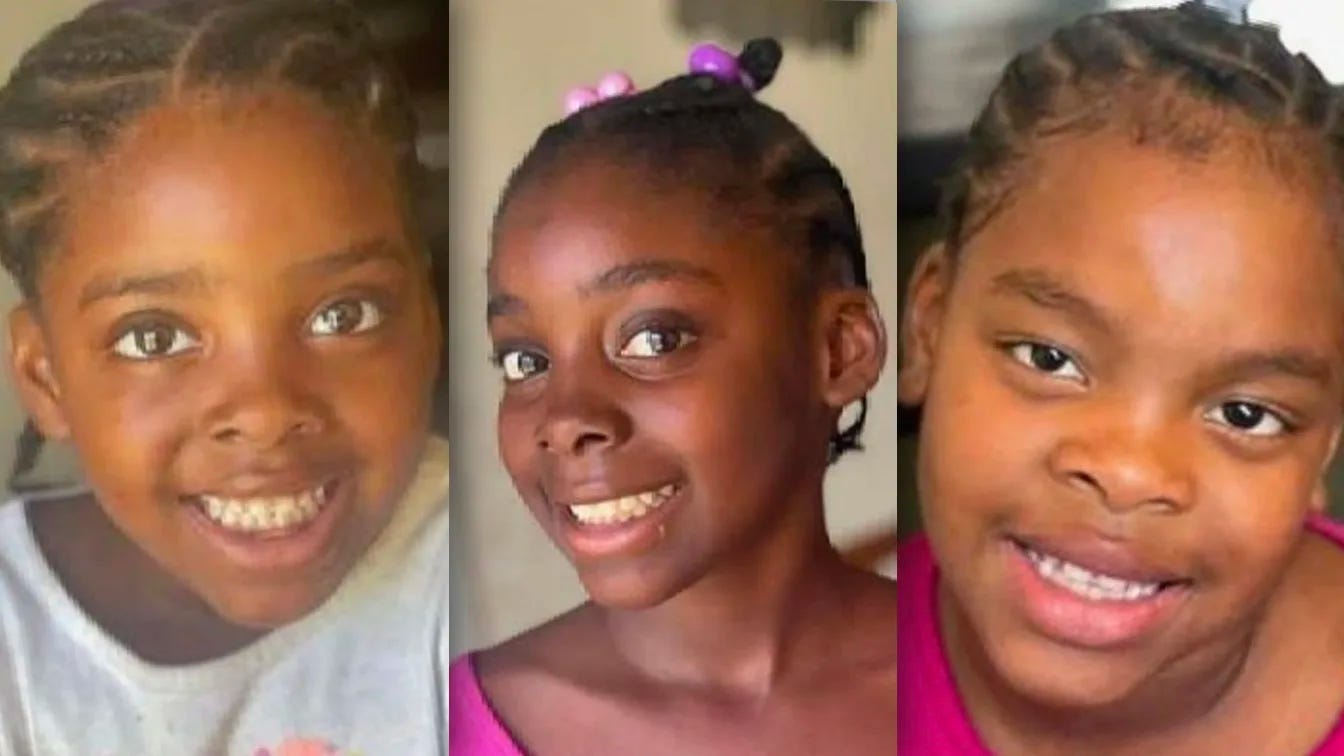
Not in a viral television news clip or the top stories on a national news website, not even on media Twitter, but through a reel reposted in my friend’s Instagram stories. That’s how I first learned about Zi’Ariel Robinson-Oliver, 9, A’Miyah Hughes, 8, Te’Mari Robinson-Oliver, 5, three sisters found dead in an East Texas pond last July.
Their mother doubted the authorities’ quick claim of drowning as the manner of death—an instinct that proved correct when, in March, an autopsy concluded the sisters are actually homicide victims as they’d been strangled to death. Lacerations were also discovered on the girls’ faces. The Cass County District Attorney’s Office told Yahoo News that a homicide investigation is now underway. This recent discovery comes almost eight months after the girls’ bodies were found about 200-yards from their home where their mother’s cousin had been babysitting them. Police have made no arrests and are still searching for suspects.
Shommaonique Oliver, the mother of Zi’Ariel, A’Miyah, and Te’Mari, has not received any answers or leads about her daughters’ deaths. And her 31-year-old cousin who had been watching the girls and had called to let her know they were gone is allegedly not cooperating with her or investigators, at the request of his mother. (Her cousin reportedly has a minor criminal history.) “Why won’t [she] let him talk to the police, or take him down to the police?” Shommaonique said to Justin Rohrlich of The Daily Beast. “...All I want is justice for my babies.”
What the mother of three additional children has received are phone calls and Facebook messages from strangers “calling her a ‘deadbeat mom,’ saying she ‘got what [she] deserves,’ and that her kids are ‘better off’ dead.’”
“This world don’t give a damn about nobody but they self,” Shommaonique told Justin on Sunday. “They need to put all that energy into finding out what happen[ed] to my babies, and not trying to come at me about my kids.”
However, Shommaonique also has a wave of supporters online who’ve supported her GoFundMe campaign and rallied to attract more media and public attention to this unsolved case. Minister Quanell X, the leader of the New Black Panther Nation, held a press conference in Cass County earlier this month alongside the girls’ mother, reported Jayla Whitfield-Anderson of Yahoo News. And on Instagram, Viola Davis reposted a reel (a copy of the video I first saw) about the murders from fellow Black actress Niecy Nash. “Why is the mainstream media not talking about the murders of these three little Black girls? asks the narrator. “We know why…” Viola told her 10.9 million followers in the caption.
A quick search of “Zi’Ariel Robinson Oliver” and “Zi’Ariel Oliver” brought up 16 results total in Google News. None of the articles were from a top 10 U.S. newspaper (I referenced this list) or any national news media outlet, outside of Yahoo News and msn.com (the latter of which is a top 10 news website, though they republished a story from The Daily Mail). Viola’s caption underscores just that—the longstanding invisibility of Black girl and women homicide victims.
Though we statistically face higher rates of violence in a variety of scenarios, those same experiences are more likely to be ignored and excluded by law enforcement (who are also sometimes the perpetrators), media, and even our own communities. This is only the third Wakeful newsletter, and yet each newsletter has featured a Black girl or young woman whose brutal death has either been mishandled by slow-moving police and investigators (Shanquella Robinson in Mexico) and/or has been underreported by the media (Ashley Burton in Atlanta). The disparity in coverage and investigations and the disparity in violence and deaths are directly related, and a reckoning of the U.S. news media’s role in this vicious cycle is long overdue.
Related:
Mom Speaks Out After 3 Daughters Are Strangled, Dumped in Pond, The Daily Beast, Justin Rohrlich
3 Black girls were found dead last year in a Texas pond. Police have made no arrests., Yahoo News, Jayla Whitfield-Anderson
3 Black Texas sisters were mysteriously killed in 2022, and there still isn't even a suspect, REVOLT, Aqua Boogie
Mississippi Continuously Fails Black Women. Let’s Finally Change That
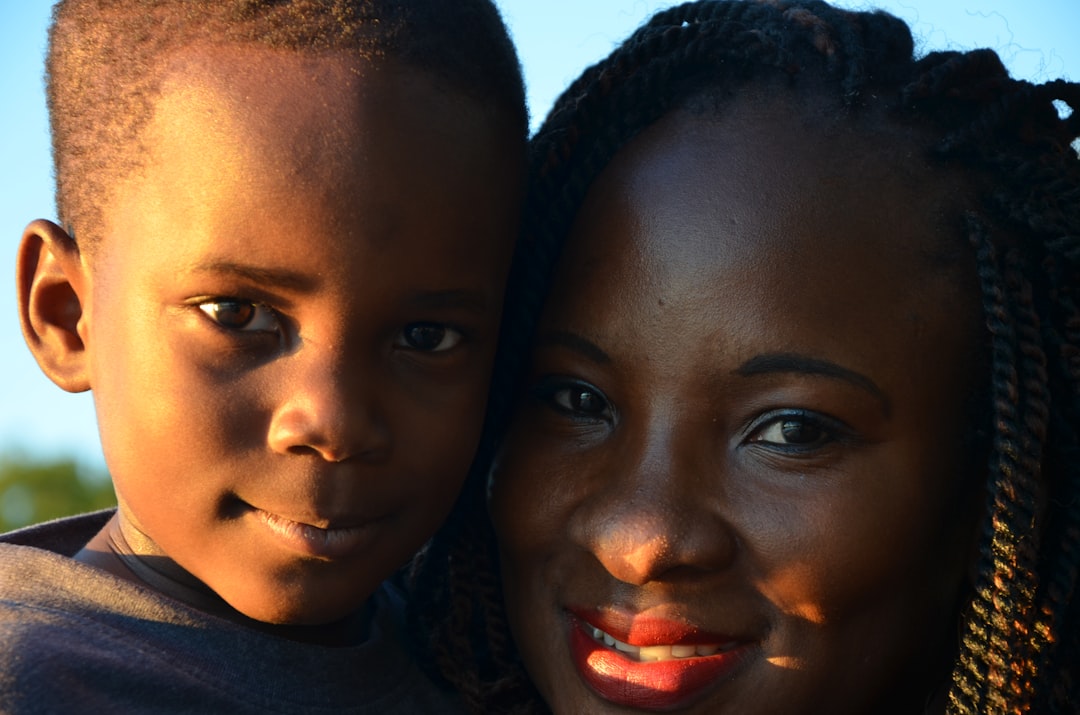
ESSENCE, Aisha Nyandoro
“Simply giving cash payments to black mothers facing poverty— instead of subsidizing the rich— can be transformative, says nonprofit leader Dr. Aisha Nyandoro.”
To figure out how to best support her fellow Black Mississippian women, Aisha Nyandoro did something so simple, yet seldom: she asked them. “In conversation after conversation, I heard different stories of needing a few extra dollars to pay for the supplies of a child’s school science fair, or the wish to have five bucks to buy a pizza as a special treat for the family on a Friday night,” she wrote. “While the uses were individual, the solution was singular: cash.”
Aisha is the founder of Springboard to Opportunities, a “radically resident-driven” Mississippi non-profit supporting women in subsidized housing complexes. In a recent ESSENCE op-ed, she recounts how launching Magnolia Mother’s Trust, “the country’s first guaranteed income program to focus exclusively on Black women living in extreme poverty,” resulted in “transformative,” tangible results, from clothing and shoes for their children to lasting emotional and mental benefits.
“We saw the invaluable benefits that come with financial security: mothers reported their children were happier, and that they were able to spend more time with them. Mothers saw significant improvements in their long-term outlook, with 79 percent feeling more hopeful about their futures and 82 percent feeling more hopeful about their children’s futures.
This op-ed clearly informs readers of a systemic, widespread issue and a proven, successful solution that could possibly be applied in similar critical scenarios. Considering the disproportionate amount of issues facing Black children and women in the U.S., the news industry could stand for more solutions-based journalism dedicated to these communities.
Related:
The Differences Between UBI and Guaranteed Income Reveal the Importance of Equity, Ms., Katie Fleischer
Guaranteed income experiment for Black women aims to tackle racial wealth gap, ABC News, Kiara Alfonseca
SF's guaranteed income program for pregnant Black women expands across California, ABC 7 News
“Girls, We Can’t Lose!”: In 1930s St Louis, Black Women Workers Went on Strike and Won
Jacobin, Devin Thomas O'Shea
“During the Great Depression, St Louis’s Funsten Nut Factory was racially divided. Black workers, mostly women, worked harder and made less than their white counterparts. So they went on strike — and got their white coworkers to join them on the picket line.”
There are some stories that instantly make you go, “Where’s the movie?” Devin Thomas O’Shea’s Jacobin article is one of those. Kicked off with 18-year-old factory worker Carrie Smith confronting her boss while wielding a brick, this story of the 1933 Funsten Nut Strike draws a “genealogy of black women’s working-class radicalism” that illustrates a larger, living history, as Keona Ervin, author of Gateway to Equality: Black Women and the Struggle for Economic Justice in St. Louis, explained. “The Ferguson liberation movement, the Fight for 15, the radical tenant organizing in Kansas City — this is all deeply connected.”
“You must follow these steps of these nutpickers,” the Trade Union Unity League (TUUL) urged in a subsequent pamphlet. “You must organize yourselves and strike!” According to the journal Working Women, the nutpickers had “aroused the masses of St. Louis like no other strike in years,” gaining the “full sympathy and solidarity of the St. Louis working class. . . . One would think that the Negro woman had been for years trained in the working-class movement.”
For the longest time, I’d mainly associated labor unions with white working class men based on film and TV representations and then, later, young white coworkers based on my experience in digital media. Then, that changed in the beginning of the coronavirus pandemic, when I learned of Chris Smalls, leader of the historic Amazon Labor Union. The U.S. labor movement has grown significantly since 2020, sparking a surge of media attention on the topic, albeit not with the same immediacy or scale. Still, I’ve never really heard of or seen histories of Black women-led worker associations, at least none specifically labeled as such. But of course rarely does erasure and exclusion from history books equate to non-existence, especially in the case of marginalized communities.
A quick Google search brought up stories about Yvonne Wheeler, the first Black woman to lead the powerful Los Angeles County Federation of Labor in its nearly 140-year history, Marvel Brisco, the first Black woman Disney union leader who successfully pushed for Disney to promote more women in the culinary division, and the Union of Southern Service Workers, a Black women-led cross-sector union made up of service industry workers across the South. Greetings from the bottom of a rabbit hole I’m actually grateful to have dug!
Related
The South has a new union—and workers have Black women to thank, PRISM, Tina Vásquez
Black Women in the Labor Movement Have Long Defended American Workers, Teen Vogue, Kim Kelly (via The Wayback Machine)
A resurging union movement must reckon with anti-Blackness, PRISM, Brenton Zola
1st Black female Disney union rep looks back at her work, legacy, News 6 Orlando, Emily McLeod and Brooke Savage
‘Nobody Can Take Your Power’: Megan Thee Stallion in Her Own Words, ELLE, Evette Dionne
“Megan Thee Stallion assumed she would be believed. But after coming forward about her shooting by fellow rapper and onetime friend Tory Lanez after a Los Angeles party in July 2020, she faced vitriol from gossip blogs, online strangers, and even peers. Here, for the first and only time since her assailant’s guilty verdict on three felony counts, she talks about moving past what happened.”
Black U.K. Women Nearly Four Times More Likely To Die From Childbirth, Forbes, Katherine Hignett
“‘Research shows that Black and Black mixed heritage women and pregnant people's concerns are not being listened to or acted upon, and they face systemic and institutional racism that means they have some of the worst pregnancy experiences. The voices of minoritized ethnic women and birthing people are consistently missing from the record and there is a pressing need for change to improve their care.’”
Was Cleopatra Black? A New Netflix Series Is Reviving an Old Controversy, TIME, Armani Syed
“One Egyptian lawyer, Mahmoud al-Semary, was so incensed by the Netflix portrayal that he is taking legal action. At the same time, some Egyptians have raised concerns about racism and colorism in modern-day Egypt, an Arab country with its own Black population.”
Black girls had their heads shaved at care home for vulnerable children, The Telegraph, Gabriella Swerling
“Researchers found that vulnerable, disabled children suffered bullying, physical abuse and sexual harm at Fullerton House, Wilsic Hall and Wheatley House. Medication was also misused and maladministered. Many of the children did not or could not speak because of autism.”
How Prison Education Overlooks Black Women, Black Girl Nerds, Archuleta Chisolm
“In Mississippi, the five vocational programs offered to women, which include cosmetology and upholstery, play into gender stereotypes. The 13 options provided to men include welding, plumbing, industrial electricity, and diesel mechanics. Women are still more likely to be restricted to classes on parenting, cooking, or cosmetology.”
These Black Women Are Giving Their Communities Their Flowers (Literally), Refinery29 Unbothered, Tamerra Griffin
“Black women have been working the earth for centuries, but recently have been engaging in flower farming, gardening, and floral design — and congregating around those practices — in more intentional and visible ways. In the wake of global protests following the brutal murder of George Floyd by Minnestota police officers, Valerie Crisostomo created Black Girl Florists, a directory-turned-organizational network for Black women working in flowers. In March, Black Girl Florists became the first all-Black women team to install a floral exhibition at the Philadelphia Flower Show in its 194-year existence.”
Single Moms by Choice: Black Women Share Their Journey, NBC4 Washington, Jummy Olabanji and Teneille Gibson
“‘Us as Black women, we have things that are unique to our experience. Black maternal health comes up a lot. Choosing a sperm donor is a different lens for us, and schooling, and medical care for your child,’ she said. McLeod said she has moments when she wishes that her family had a second salary. But she leverages her community. ‘Don't have pity on me. I chose this. I'm super excited about my life. I have zero regrets about having the kids the way that I did.’”
MORE STORIES CONTINUED BELOW
Have you seen these Black girls posted by the Black and Missing Foundation?
Naviya Carey, 13, of Baltimore, MD
Monica Festus, 11, of Buffalo, NY
Daria Fortune, 16, of Oakland, CA
Destiny Ayala-Patterson, 16, of Chesapeake, VA
Black teen girls are the curators of culture, Vox, Ile-Ife Okantah
“While brands and investors have clearly noticed the lucrative cultural capital of Black girls, there is still a lack of respect and political support for them. This creates an oxymoronic landscape where Black teenage girls are overlooked while simultaneously being the leading curators of popular culture, with their impact (if it’s even recognized in the first place) ultimately attributed to Black culture as a whole.”
‘I felt alone’: new UK play shows Black women’s experiences with breast cancer, The Guardian, Mabel Banfield-Nwachi
“‘There were times, as in the play, where I was up against makeup not being available in a makeup class, the right colour prosthetic not being available and you feel like you don’t always want to speak up against those things … that’s when I found Black Women Rising.’ Black Women Rising’s 100 Women Survey found that 74% of those who use a softie (a fabric prosthesis often provided after a mastectomy), a prosthetic breast or nipple were not offered one to match their skin tone.”
Meet The Founder Of Black Girl Environmentalist, Essence GU, Kenyatta Victoria
“The climate crisis in itself is a political issue in understanding the systems that led us to be here,” she said. “In my work as an environmental justice scholar and activist, I try to connect the dots between how colonialism, systemic racism and patriarchy have led us to the point where we have a climate crisis.”
Black women are a force in the outdoors. This L.A. hiking group proves it, The Los Angeles Times, Dakota Kim
“Over the next few years, the initial desire to unite Black women hikers grew into larger goals: promoting outdoor equity and the creation of safe spaces. As of today, the two — who run BGT in addition to their day jobs — have hosted almost 100 hikes and 20 events, and the Instagram page has become a community of more than 36,000 people. There’s now a TikTok too.”
New study suggests Black women should be screened earlier for breast cancer, CNN, Jacqueline Howard
“An international team of researchers wrote in the study, published Wednesday in the journal JAMA Network Open, that clinical trials may be warranted to investigate whether screening guidelines should recommend Black women start screening at younger ages, around 42 instead of 50.”
This Powerful HIV-Prevention Initiative Centers Pleasure for Black Women—A Demo That Accounts for 60% of New HIV Infections in U.S. Women, Well + Good, Erica Sloan
“By refocusing on the reasons why Black women may want or need to seek HIV testing or care, the "Risk to Reasons" initiative is also turning that sex narrative on its head: Pleasure isn't something to be avoided or feared due to the risk of contracting HIV, but instead, the seeking of pleasure can serve as a reason why a Black woman may choose to be proactive against the virus.”
Taraji P. Henson Wants to Humanize Black Women, InStyle, Tessa Petak
“At the beginning of this month, the brands announced that She Care Wellness Pods would be installed at universities across the country, starting with Alabama State University. The goal of the pods are to provide mental health resources as well as a designated safe haven for 25,000 Black women.”
Meet Vic Styles: Founder of Black Girls Smoke, NBC New York, Kay Angrum
“Black Girls Smoke founder and entrepreneur Vic Styles is pushing for New York City parks to create designated smoking spaces for cannabis consumers. Her ‘Puff in the Park’ rally on 4/20 is one step toward that goal.”





